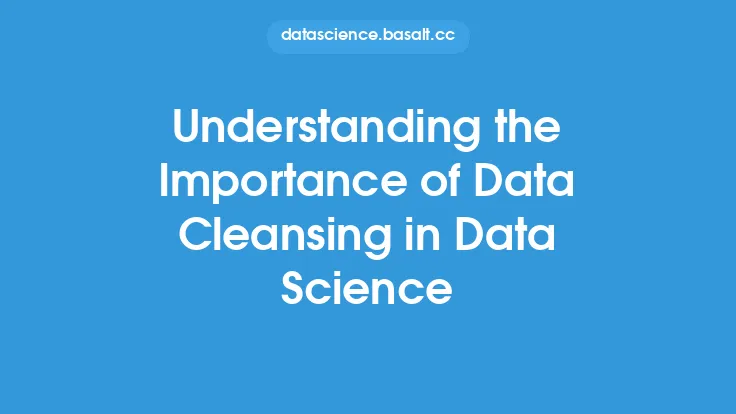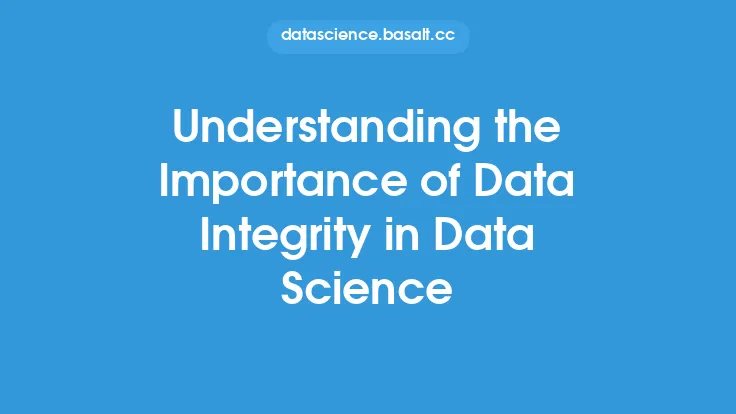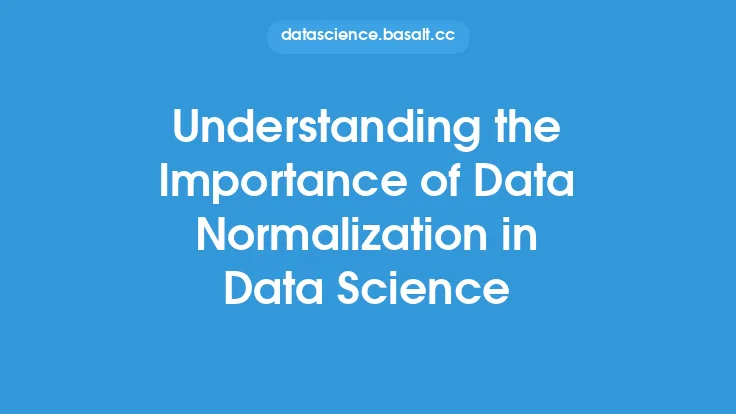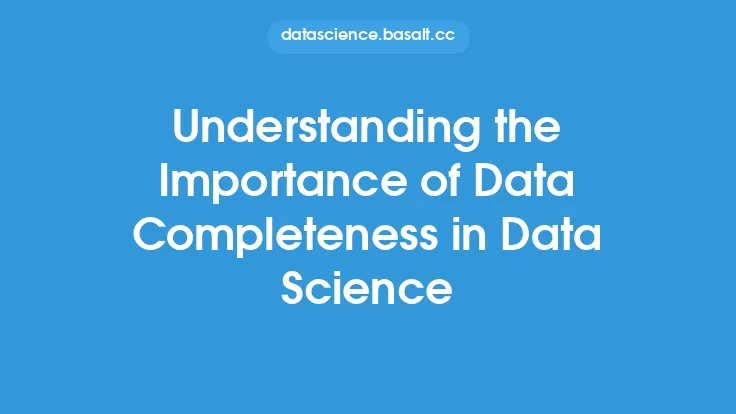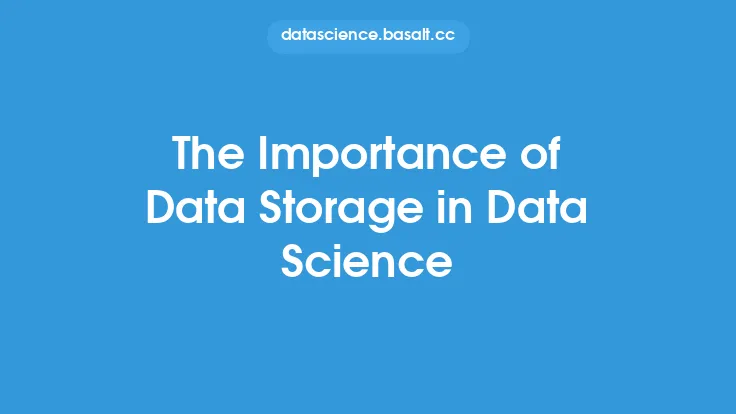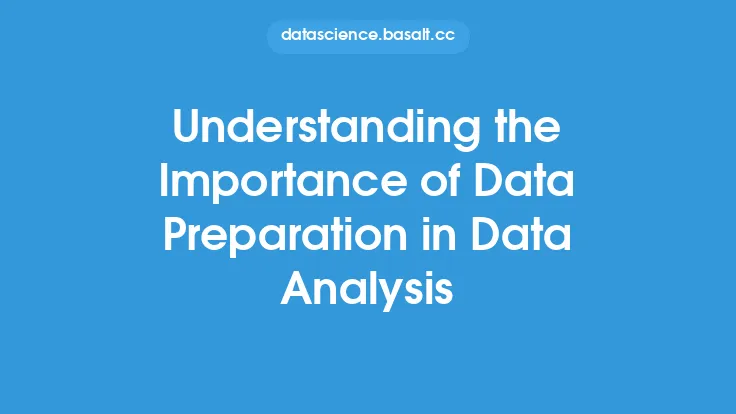Data validation is a critical component of data science, as it ensures the accuracy, completeness, and consistency of data used in various applications, including machine learning models, data analytics, and business intelligence. The process of data validation involves checking data for errors, inconsistencies, and inaccuracies, and correcting or removing them to ensure that the data is reliable and trustworthy. In this article, we will delve into the importance of data validation in data science, its benefits, and the consequences of neglecting it.
Introduction to Data Validation
Data validation is an essential step in the data science workflow, as it helps to ensure that the data used for analysis, modeling, and decision-making is accurate, complete, and consistent. The process of data validation involves a series of checks and tests that are applied to the data to identify errors, inconsistencies, and inaccuracies. These checks can include data type checks, range checks, format checks, and consistency checks, among others. The goal of data validation is to ensure that the data is reliable, trustworthy, and fit for purpose.
Benefits of Data Validation
Data validation offers several benefits, including improved data quality, increased accuracy, and enhanced decision-making. By validating data, organizations can ensure that their data is accurate, complete, and consistent, which is essential for making informed decisions. Data validation also helps to prevent errors, inconsistencies, and inaccuracies, which can have serious consequences, such as financial losses, reputational damage, and legal liabilities. Additionally, data validation can help to improve the efficiency and effectiveness of data analysis, modeling, and decision-making, by reducing the time and effort required to clean, transform, and analyze data.
Consequences of Neglecting Data Validation
Neglecting data validation can have serious consequences, including data errors, inconsistencies, and inaccuracies. These errors can propagate through the data science workflow, causing incorrect results, flawed models, and poor decision-making. Additionally, neglecting data validation can lead to data breaches, cyber attacks, and other security threats, as invalid or inconsistent data can create vulnerabilities that can be exploited by hackers and other malicious actors. Furthermore, neglecting data validation can damage an organization's reputation, erode customer trust, and lead to financial losses, legal liabilities, and regulatory penalties.
Data Validation in Machine Learning
Data validation is particularly important in machine learning, as it helps to ensure that the data used to train and test models is accurate, complete, and consistent. Machine learning models are only as good as the data they are trained on, and invalid or inconsistent data can cause models to produce incorrect results, or to fail to generalize to new data. By validating data, machine learning practitioners can ensure that their models are trained on high-quality data, which is essential for achieving good performance, accuracy, and reliability. Additionally, data validation can help to prevent overfitting, underfitting, and other machine learning pitfalls, by ensuring that the data is representative of the problem domain, and that the models are not biased or skewed.
Data Validation in Data Analytics
Data validation is also important in data analytics, as it helps to ensure that the data used for analysis is accurate, complete, and consistent. Data analytics involves the use of statistical and mathematical techniques to extract insights and patterns from data, and invalid or inconsistent data can lead to incorrect results, flawed conclusions, and poor decision-making. By validating data, data analysts can ensure that their results are reliable, trustworthy, and actionable, which is essential for making informed decisions, and for driving business outcomes. Additionally, data validation can help to improve the efficiency and effectiveness of data analysis, by reducing the time and effort required to clean, transform, and analyze data.
Technical Aspects of Data Validation
From a technical perspective, data validation involves the use of various techniques, tools, and technologies, including data profiling, data quality metrics, and data validation algorithms. Data profiling involves the use of statistical and mathematical techniques to analyze data, and to identify patterns, trends, and anomalies. Data quality metrics involve the use of metrics, such as accuracy, completeness, and consistency, to measure the quality of data. Data validation algorithms involve the use of algorithms, such as data type checks, range checks, and format checks, to validate data. Additionally, data validation can involve the use of data validation frameworks, data quality platforms, and data governance tools, which provide a structured approach to data validation, and help to ensure that data is accurate, complete, and consistent.
Best Practices for Data Validation
To ensure effective data validation, several best practices should be followed, including defining clear data validation rules, using automated data validation tools, and performing regular data quality checks. Clear data validation rules should be defined, and communicated to all stakeholders, to ensure that everyone understands what data is valid, and what data is not. Automated data validation tools should be used, to reduce the time and effort required to validate data, and to improve the accuracy and consistency of data validation. Regular data quality checks should be performed, to ensure that data remains accurate, complete, and consistent, over time. Additionally, data validation should be performed at multiple stages of the data science workflow, including data ingestion, data processing, and data analysis, to ensure that data is valid, and reliable, throughout the entire workflow.
Conclusion
In conclusion, data validation is a critical component of data science, as it ensures the accuracy, completeness, and consistency of data used in various applications, including machine learning models, data analytics, and business intelligence. The benefits of data validation include improved data quality, increased accuracy, and enhanced decision-making, while the consequences of neglecting data validation include data errors, inconsistencies, and inaccuracies, which can have serious consequences. By following best practices for data validation, and using various techniques, tools, and technologies, organizations can ensure that their data is accurate, complete, and consistent, which is essential for making informed decisions, and for driving business outcomes.
